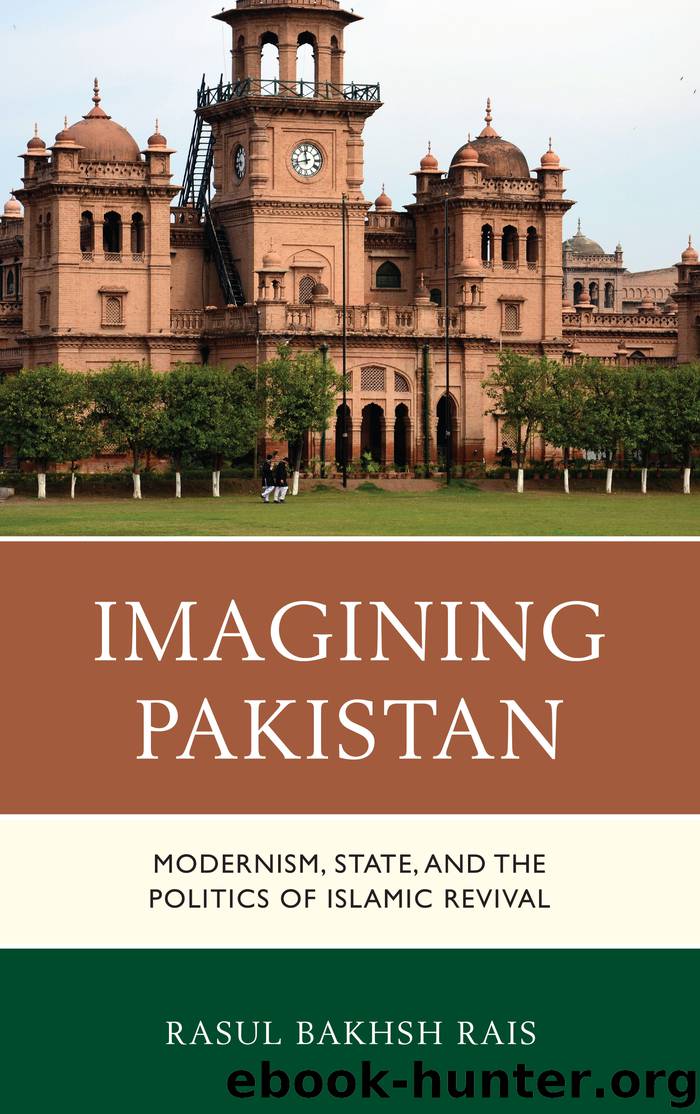Imagining Pakistan by Rasul Bakhsh Rais

Author:Rasul Bakhsh Rais
Language: eng
Format: epub
Tags: undefined
Publisher: Lexington Books, a division of Rowman & Littlefield Publishers, Inc.
Published: 2012-12-11T16:00:00+00:00
Political Use of Islam
Islamic thought and ideas run deep in society though in great variation along different theological lines. Deep down, Pakistani society is invariably embedded in Islamic culture, civilization, and religious practices. For centuries, Islam has been a dominant feature of these lands, and it has co-existed with Hinduism and other sub-continental religions. The fusion of Islam with politics started only with the independence of Pakistan, as some of the religious groups began to demand establishment of an Islamic state. These groups lack the popularity and public support but have been able to show greater street power than any other groups throughout the history of Pakistan. They have adopted and excelled at street agitation, sit-ins, and violent demonstrations in support of their demands. The tragedy of the Pakistani elite is that instead of countering the ideas of the Islamist groups they chose to use a diluted Islamic agenda in a vain attempt to delegitimize and compete with the religious groups. That was, and has been a bad strategy, as the political elites have increasingly found it difficult to beat the religious parties on their own agenda, which has kept expanding. In the process, they have subverted Pakistan’s moderate and modernist political heritage. Islamization by the statist elites, particularly under general Zia, not only legitimized the use of religion for political ends, but more significantly, it legitimized the Islamic agenda of the religious groups and parties. Consequently, religious groups of every sect and idea have proliferated; they have become more resourceful, recalcitrant in their attitudes, and some have turned to radicalism and militancy hoping they can force the Pakistani state to implement their demands of implementation of the Sharia. These actors, once aligned with the Pakistani state, have over time, captured more social and political space at the grass-roots level.
The role religion should play in modern day politics is a well-debated but settled issue in the Western world since the separation of the Church and secular authority a few centuries back. But the culture and values that religion, any religion for that matter, generates within the society seek to influence politics. But in Islamic countries, where religion dominates social life, the role religion plays in politics remains widely undefined and unsettled. How much of politics, law and public policy, or private attitudes and behaviors should be determined by religion is a contentious and sometimes an inflammable political issue. In Pakistan, we witness two different political worldviews on the relation between religious and politics. The religious groups, parties and the hugely expanded madrassa network, some of which are connected with religious parties insist that Islam is the ideology of Pakistan and is reason for becoming an independent state. They consider their demand for Islamization as a religious obligation and refuse to settle on anything less than that.[48] The liberal, moderates sections of the society and the leaders of mainstream political parties suffer from ambivalence on the role of religion and often feel threatened, intimidated, and weak. They evade the big question
Download
This site does not store any files on its server. We only index and link to content provided by other sites. Please contact the content providers to delete copyright contents if any and email us, we'll remove relevant links or contents immediately.
| Africa | Americas |
| Arctic & Antarctica | Asia |
| Australia & Oceania | Europe |
| Middle East | Russia |
| United States | World |
| Ancient Civilizations | Military |
| Historical Study & Educational Resources |
The Sympathizer by Viet Thanh Nguyen(4386)
The Rape of Nanking by Iris Chang(4209)
World without end by Ken Follett(3476)
Ants Among Elephants by Sujatha Gidla(3463)
Blood and Sand by Alex Von Tunzelmann(3200)
Japanese Design by Patricia J. Graham(3168)
The Queen of Nothing by Holly Black(2588)
City of Djinns: a year in Delhi by William Dalrymple(2555)
Foreign Devils on the Silk Road: The Search for the Lost Treasures of Central Asia by Peter Hopkirk(2463)
India's Ancient Past by R.S. Sharma(2451)
Inglorious Empire by Shashi Tharoor(2437)
Tokyo by Rob Goss(2428)
In Order to Live: A North Korean Girl's Journey to Freedom by Yeonmi Park(2387)
Tokyo Geek's Guide: Manga, Anime, Gaming, Cosplay, Toys, Idols & More - The Ultimate Guide to Japan's Otaku Culture by Simone Gianni(2370)
India's biggest cover-up by Dhar Anuj(2352)
The Great Game: On Secret Service in High Asia by Peter Hopkirk(2345)
Goodbye Madame Butterfly(2251)
Batik by Rudolf Smend(2179)
Living Silence in Burma by Christina Fink(2068)
